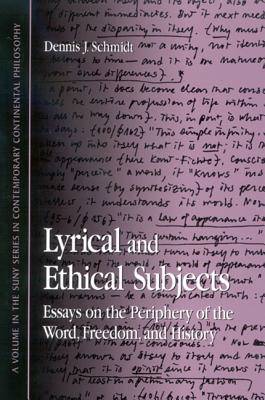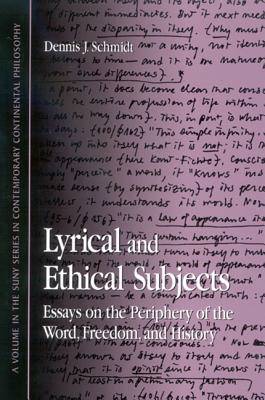
- Retrait gratuit dans votre magasin Club
- 7.000.000 titres dans notre catalogue
- Payer en toute sécurité
- Toujours un magasin près de chez vous
- Retrait gratuit dans votre magasin Club
- 7.000.0000 titres dans notre catalogue
- Payer en toute sécurité
- Toujours un magasin près de chez vous
Lyrical and Ethical Subjects
Essays on the Periphery of the Word, Freedom, and History
Dennis J SchmidtDescription
A wide-ranging attempt to develop a theory of ethical life from a hermeneutic understanding of language.
Dennis J. Schmidt develops a hermeneutic theory of language that forms the starting point for thinking through the concerns of ethical life. Working from texts by Homer, Plato, Kant, Nietzsche, Heidegger, and Gadamer, this volume explores some of the ways in which we experience the fringes of language, and highlights the relation of both freedom and history to such experience. The book is also guided by the conviction that such reflections upon the limits of language can open up something decisive for the effort to address the enigmas and challenges of judgment in the realm of ethical life.
Taking seriously Kant's claim in the Third Critique that aesthetic experience opens up a basis for judging that is other than that found in the language of the concept, Schmidt pursues this claim by addressing the relation of language to poetry, to music, to silence, to script, to sign language, and to painting-those experiences of language which set themselves apart from the concept. Out of the treatment of these experiences of language at its limits, the author argues that we find an opening upon the realm of ethical life that is truly beyond the calculus of good and evil. What results is an experience of radical freedom, an experience that precedes anything like a notion of freedom finding its explanation in the agency of a subject. It is here that we find the contours of what Heidegger once described as "original ethics," and experience something of the sources of ethical life.
Spécifications
Parties prenantes
- Auteur(s) :
- Editeur:
Contenu
- Nombre de pages :
- 239
- Langue:
- Anglais
- Collection :
Caractéristiques
- EAN:
- 9780791465134
- Date de parution :
- 25-08-05
- Format:
- Livre relié
- Format numérique:
- Genaaid
- Dimensions :
- 152 mm x 229 mm
- Poids :
- 453 g

Les avis
Nous publions uniquement les avis qui respectent les conditions requises. Consultez nos conditions pour les avis.






